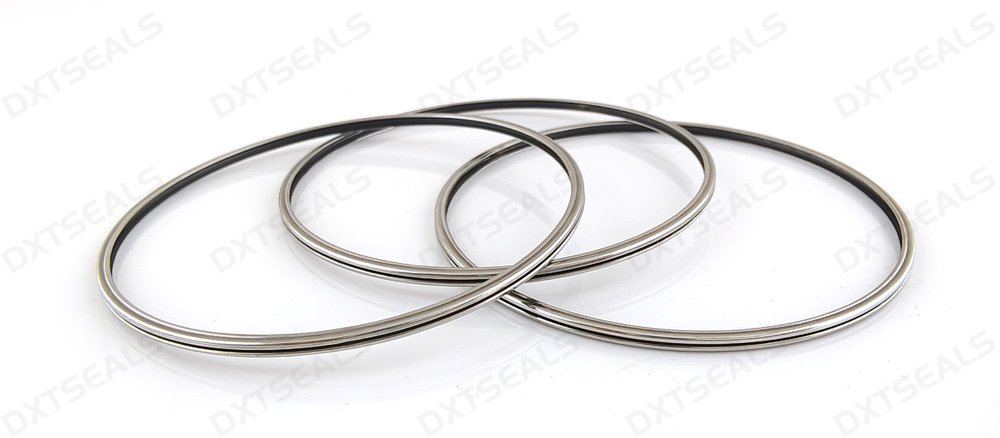
Metal E-ring seals are designed to meet the needs of high-pressure and high-stress industrial applications. Their distinct "E" shape allows them to deliver effective sealing in environments where other types of seals might fail due to extreme pressure, temperature fluctuations, or exposure to harsh chemicals. This article will delve into the unique characteristics of metal E-ring seals and their widespread applications in industries requiring robust sealing solutions.
1. What Are Metal E-Ring Seals?
Metal E-ring seals are precision-engineered sealing components made from durable metals such as stainless steel, Inconel, and other high-performance alloys. Their E-shaped cross-section enables the seal to provide excellent sealing under high-pressure conditions. The design allows the seal to expand and compress, ensuring a secure fit even in dynamic or fluctuating environments.
2. Key Characteristics of Metal E-Ring Seals
- High-Pressure Resistance: Metal E-ring seals are specifically designed to handle high-pressure environments, often exceeding the performance of traditional seals. Their robust design ensures a tight, leak-free seal in systems that operate under extreme pressure, making them ideal for industries such as oil and gas, aerospace, and power generation.
- Temperature Tolerance: One of the main benefits of metal E-ring seals is their ability to withstand a wide temperature range, from cryogenic conditions to extremely high temperatures. This makes them suitable for use in equipment that experiences rapid temperature fluctuations or operates at extreme temperatures.
- Durability and Longevity: Due to their metallic construction, E-ring seals offer exceptional durability. They are resistant to wear and tear, which extends their lifespan in demanding environments, reducing the need for frequent maintenance and replacement.
- Corrosion and Chemical Resistance: Metal E-ring seals can be manufactured from materials that provide excellent resistance to corrosive chemicals and aggressive fluids. This feature ensures that the seals perform well in harsh environments such as chemical processing plants and offshore drilling rigs.
- Customizable Design: Metal E-ring seals can be customized to meet specific industrial needs. Depending on the application, these seals can be manufactured from various alloys and designed to fit unique geometries, making them a versatile choice for complex sealing requirements.
3. Common Materials for Metal E-Ring Seals
- Stainless Steel: Widely used for its corrosion resistance and strength, stainless steel is a popular choice for metal E-ring seals in industries exposed to moisture, chemicals, or high temperatures.
- Inconel: This nickel-based superalloy is renowned for its resistance to oxidation and its ability to retain strength at high temperatures, making it ideal for high-pressure and high-temperature applications.
- Hastelloy: Known for its superior resistance to chemical corrosion, Hastelloy is used in applications that involve exposure to aggressive chemicals, such as those found in chemical processing plants.
4. Applications of Metal E-Ring Seals in High-Pressure Environments
Metal E-ring seals are trusted in a variety of industries that require reliable performance under high pressure and extreme conditions. Below are some of the most common applications:
- Oil and Gas Industry: In oil and gas exploration and production, metal E-ring seals are used in high-pressure valves, wellheads, and blowout preventers. Their resistance to high pressures and corrosive environments makes them essential for maintaining safe and leak-free operations in these critical systems.
- Aerospace Industry: In aerospace applications, metal E-ring seals are used in jet engines, fuel systems, and landing gear. Their ability to withstand both high pressures and wide temperature ranges ensures they can perform reliably in aircraft systems where safety and efficiency are paramount.
- Power Generation: Power plants, particularly those that rely on steam turbines and high-pressure piping, utilize metal E-ring seals to maintain tight seals in systems that operate under extreme pressures and temperatures. Their durability and high-performance capabilities contribute to the overall efficiency of power generation systems.
- Chemical Processing: In chemical plants, metal E-ring seals are used in reactors, pipelines, and pumps. Their resistance to aggressive chemicals and ability to maintain tight seals in high-pressure environments ensure the safety and effectiveness of the processing equipment.
5. Advantages of Metal E-Ring Seals Over Traditional Rubber Seals
While traditional rubber seals are suitable for many industrial applications, metal E-ring seals offer several key advantages for high-pressure environments:
- Superior Pressure and Temperature Resistance: Metal E-ring seals outperform rubber seals in extreme pressure and temperature conditions. Rubber seals can degrade or fail in high-pressure environments, while metal seals remain effective.
- Extended Service Life: Metal E-ring seals offer greater durability and resistance to wear, reducing the need for frequent replacement. This is particularly beneficial in industries where downtime can be costly.
- Chemical and Corrosion Resistance: Metal E-ring seals can withstand exposure to harsh chemicals and corrosive materials, making them a more reliable choice in environments where rubber seals might deteriorate.
6. Conclusion
Metal E-ring seals provide unmatched sealing performance in high-pressure, high-temperature, and chemically aggressive environments. Their durability, versatility, and ability to handle extreme conditions make them indispensable in industries such as oil and gas, aerospace, power generation, and chemical processing. When compared to traditional rubber seals, metal E-ring seals offer superior reliability, longer service life, and a higher level of performance, making them the ideal choice for demanding industrial applications.
